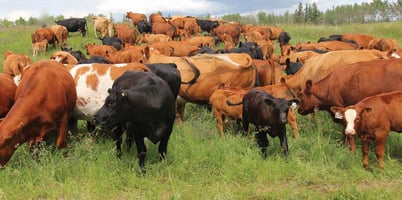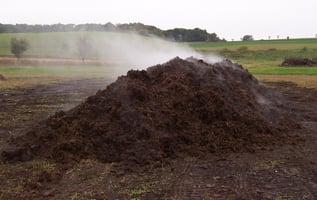I'm no environmentalist. But the radical environmentalists that are concerned with methane coming...
How To Find Good Grub

In a previous post, Label Libel: Things Are Not What They Seem , I debunked the idea that the USDA can be trusted to tell us our food is "Natural", and the like, showing how little those labels really mean. So you were probably wondering: "What should I be looking for in my food?"
Well here's how Joel Salatin explains this: Imagine you eat as healthy as is possible for a human to eat. You go whole hog: certified "organic", non-GMO, and all, but you quit brushing your teeth, doing physical exercises, showering, etc. Would you be any more healthy than somebody who patronizes McDonald's every day, but has a healthy lifestyle otherwise? No, probably not. Now let's do the same comparison with chickens: You feed certified "organic", non-GMO , all "natural" grain, but your chickens never see the light of day, never see grass or bugs, let alone eat them. They are crowded into a chicken concentration camp. They will be much less healthy for you than a chicken that eats GMO grains, but gets lots of fresh grass, freedom to move around, and plenty of sunshine every day.
In short, I believe that animal lifestyle is much more important than diet. Fresh grass is crucial for our livestock to be at peak health and nutrition.
GMO is particularly disturbing to me, so I've researched it lately. I understand that bioengineered sounds pretty weird. I agree, but studies have shown that there are no adverse health effects. This is an interesting fact, because many people, including me, assume that it is bad for you. Also, many would assume that bioengineered seed is fake, lab made seed. Really, all they do is inject the seed with a different DNA, and not for no reason. Usually, it is modified to resist pests and herbicide. The main downside I see is that GMO grains are usually modified to withstand Roundup, which is a glyphosate product and is highly dangerous to health.
Another thing: if chickens (and other grazers) are on pasture, much of their diet is supplemented with grass. For chickens, one third of their diet is usually supplemented. That means that even if a chicken is fed GMO grain, if it is on pasture, it is a third less GMO. It is not all or nothing.
So there's a quick guide on how to find good grub: go by lifestyle and not by diet. Always look for happy, healthy animals on fresh pasture. Look for people who are nurturing their land. Look for optimists, not farmers who are just gonna keep going till they finish going broke. Vote with your fork, and things will change.




